Spies and Sparrows: ASIO and the Cold War
Spies and Sparrows is extensively researched, the archival plumbing being deep and comprehensive. It links social history with political history, the individual with the institutional, the local with international alliances. Significantly, it follows the command that all historians should follow – the obligation to communicate, to make the narrative clear and the text readable. It is an antidote to the terminal dullness of Australia’s recent official histories.
READ REVIEW
↓
Spies and Sparrows: ASIO and the Cold War
Phillip Deery | 2022
I start with a personal – but relevant - anecdote. Back in the mid-1970s ASIO attempted to recruit a close family member. This close family member, a university undergraduate at the time, was asked to join one, or several, of the more radical student organisations that had grown up in the wake of the Vietnam War. In other words, to act as a mole, though I now know after reading this book that ‘sparrow’ was ASIO’s preferred term. The close family member told the agent what to do with his offer and later the rest of us laughed at the mere idea of ASIO. Who were these Z-list spies but obsessive collectors of useless data about harmless progressive movements? An outmoded joke, we thought.
We move forward to this excellent new book by Cold War expert, Phillip Deery, which examines the experience of eight individuals, who between 1949 and approximately 1975, came into close and enduring contact with ASIO. This group includes the scientist Tom Kaiser, and the doctor Paul Reuben James, whose careers were derailed by ASIO casting suspicion on their extramural political activities. There are three sparrows: William Dobson, who may have claims to being Australia’s most successful fraudster and conman; Anne Neill, an astonishingly successful undercover agent; and Max Wechsler, who made a hash of just about everything in his life. Then there is the Greek Cypriot immigrant Demetrius Anastassiou, whose penchant for pronounced left-wing beliefs made him the subject of sustained discrimination by Australian authorities, despite not breaking any laws. Michael Brown passed on information to the wrong people about surface-to-air missiles and may have been lucky not to receive a tougher punishment. Evdokia Petrov may be the most tragic of the eight – left in the lurch by her husband, the much-studied Vladimir, who comes across as a cad as much as anything else. Though ASIO funded and supported her for the rest of her time in Australia, Evdokia pined for the USSR and a culture she had not repudiated.
Phillip Deery links these life stories to his overriding themes: the ideological divisions of the Cold War, the obsessional outlook of the spook industry, the good – if naïve – actions of social activists, ASIO’s interference in the lives and happiness of people – and the sheer wackiness of some of their agents. He shows how ASIO was established in 1949 by a soon-to-be booted Labor government that was as hard on ‘commos’ as its coalition successors would be, and who were desperate to get back into the Americans’ good books after the notorious Venona decryptions had resulted in Australia getting booted from the United States’ intelligence loop. The term ‘subversive’ was a slippery one and ASIO interpreted it broadly. They targeted the Communist Party of Australia, though its glory days – if these had ever been – were over. In the 1970s they switched to the heterogeneous movements we can group under the heading of ‘New Left’. Hence, the attempt to recruit my close family member. But my family was wrong. ASIO was not just some silly right-wing joke.
Spies and Sparrows is extensively researched, the archival plumbing being deep and comprehensive. It links social history with political history, the individual with the institutional, the local with international alliances. Significantly, it follows the command that all historians should follow – the obligation to communicate, to make the narrative clear and the text readable. It is an antidote to the terminal dullness of Australia’s recent official histories.
I have minor cavils. Sweden is not and never has been a member of NATO. As any self-respecting Scandinavian would tell you, Sweden makes a fetish of neutrality and avoiding formal participation in pan-national organisations. If I lived near Czarist, Soviet or Putin’s Russia, I might do the same. There are a lot of inverted commas around terms that do not seem to be quotes and probably don’t need highlighting as they are common phrases and not slang.
The Cold War might seem as remote as the Hundred Years’ War to some people. But as Phillip Deery argues in his succinct conclusion, since the terrorist attacks in the United States on 11 September 2001, Australia has passed myriad laws against terrorism, though we are not, it seems, a major target. Vigilance is needed but security agencies being granted excessive powers erodes democracy.
Reviewer: Richard Trembath, PHA (Vic & Tas)
Spies and Sparrows: ASIO and the Cold War is published by Melbourne University Publishing.

